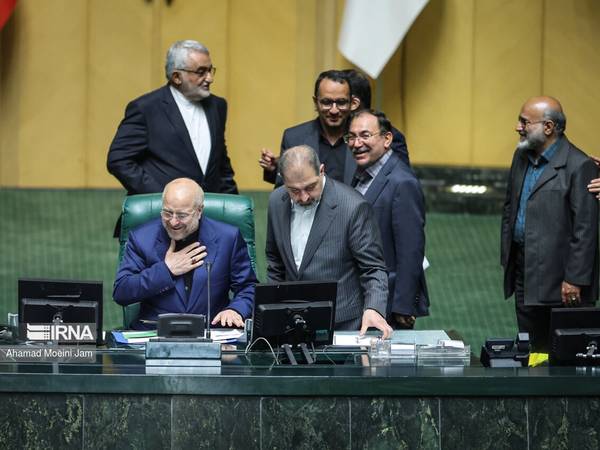The re-election of Mohammad Bagher Ghalibaf as the Speaker of Parliament in Iran on Tuesday, with a comfortable margin, demonstrated that ultra-conservatives are weaker than expected.
Before the internal election, the prevailing assumption in the Iranian political landscape was that Ghalibaf had around 70 supporters in Parliament. This was 30 fewer than the ultra-conservative Paydari Party, which backed Qom MP Mojtaba Zolnour in the election for Speaker and the presidium.
This turned out to be not accurate as Ghalibaf won 198 votes out of a total of 290. Whatever the true number of Ghalibaf and Paydari's supporters are at the Majles, the group loosely characterized as "independents" is now better known to have a real weight in the legislature.
This group can potentially swing either way when it comes to the ratification of bills, which will only become law after endorsement by the conservative-dominated Guardian Council. However, this flexibility will remain only until the "independents," or a significant portion of them, form a new faction with predefined political preferences.
Meanwhile, the results revealed that traditional conservatives, once considered a major force in parliament, wielded little political influence. Their representative, former foreign minister Manouchehr Mottaki, received only 5 votes, one of which was certainly his own. This outcome was a surprising and disgraceful blow to their perceived strength.
In the previous parliament, traditional conservatives had 11 members and were believed to have the capacity to garner support for their proposals. However, they failed to present any new ideas and merely followed the hardliners in their efforts to crack down on women's hijab and social media.
Ghalibaf won the Speaker's seat despite widespread smear campaigns by his political rivals and the public's dissatisfaction over his inefficiency in the previous parliament. It remains unclear whether his re-election was influenced by "political decisions from higher up," as many politicians have speculated about the support for Ghalibaf from Khamenei's inner circle.
According to the Khabar Online website, Ghalibaf can now begin his presidential campaign, confident in the safety net provided by his position in the Majles in case his presidential ambitions do not materialize.
He participated in the internal election of the Majles despite numerous calls from lawmakers for him to step back and choose between the presidential race and the competition for the Speaker's seat. However, Ghalibaf opted to continue campaigning on both fronts. In a last-minute shift, Ghalibaf, who had been forging an alliance with the Paydari faction based on trading concessions as in the previous round, instead formed an alliance with the "independents."
Not only this new idea worked, but it gave new leverage to the "independents" as a parliamentary force to be reckoned with. This is particularly important as the "independents" officially declared their support for Ghalibaf minutes before the vote.
Another significance of the election on Tuesday is in the vast difference between the number of votes won by Ghalibaf and his Paydari Party rival Zolnour. Whether Ghalibaf can effectively benefit from this edge during the next four years is another story.
There were 24 void votes, which represented the "independents" who did not support any of the three candidates.
The two deputy speakers came from Paydari, Ali Nikzad with 142 votes, and Haji Babaei with 154. However, although members of the presidium are not known to exert any influence on the proceedings of the Majles, according to Khabar Online, Ghalibaf's supporters have the upper hand in the presidium.
